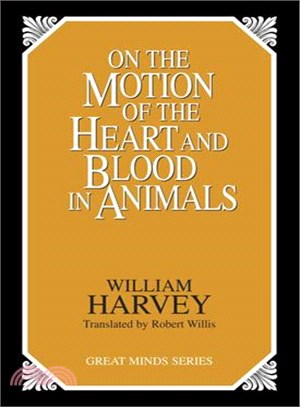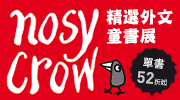On the Motion of the Heart and Blood in Animals
商品資訊
ISBN13:9780879758547
出版社:Prometheus Books
作者:William Harvey; Robert Willis (TRN)
出版日:1993/11/01
裝訂:平裝
規格:21.6cm*14cm*0.6cm (高/寬/厚)
定價
:NT$ 600 元無庫存,下單後進貨(到貨天數約30-45天)
下單可得紅利積點:18 點
商品簡介
作者簡介
商品簡介
William Harvey (1578-1657) was a rebel in medical science: Contrary to contemporary practice, he began his epoch-making investigation into the action of the heart and the blood's circulation by minutely observing their action in live animals and by a lengthy series of dissections, rather than by mere reliance on the anatomical lessons of ancient medicine and philosophy. "On the Motion of the Heart and Blood in Animals", including explanations of heart valves and arterial pulse, stands as a triumph of true scientific inquiry, and is still regarded as one of the greatest discoveries in physiology.
作者簡介
William Harvey (1578 – 1657), the oldest son of Thomas Harvey, was born at Folkestone, Kent, England, on April 1, 1578. He was educated at King's School, Canterbury, and Cam-bridge University, where he received his B.A. at the age of nineteen. Having chosen medicine as his career, Harvey entered the University of Padua, where he studied under the famed anatomist Girolamo Fabrici (Hieronymus Fabricius ab Aquapendente) and his pupil Giulio Casserio.
Upon receiving his M.D. in 1602, Harvey returned to England, where he married the daughter of Dr. Lancelot Brown, former physician to Elizabeth I; he became a fellow of the Royal College of Physicians in 1607, physician to St. Bartholomew's Hospital in 1609, and Lumleian lecturer at the College of Physicians. In 1616, Harvey began a series of lectures on the movement of the heart and blood.
Appointed physician extraordinary to King James I, Harvey maintained close professional ties to the royal family until the end of the Civil War. Under Charles I, Harvey was made warden of Merton College, Oxford, in 1645, but resigned a year later due to advancing age; thereupon he was offered the presidency of the College of Physicians. William Harvey died, in his eightieth year, on June 7, 1657.
Harvey's groundbreaking work, Exercitatio anatomica de mote cordis et sanguinis in animalibus (On the Motion of the Heart and Blood in Animals), including explanations of heart valves and arterial pulse, was published in Latin in 1628. Despite increasing knowledge about blood circulation and the discovery of valves in the veins, the studies of physiology and anatomy in Harvey's day were still dominated by ancient Greek philosophy and medicine,?notably Aristotle and Galen, who taught that in human beings and the higher animals, the blood was elaborated in the liver and sent to the heart, from where it circulated through the body. While the veins carried blood, the arteries carried both blood and a kind of vital air, or spirit (pneuma).
Harvey's work was revolutionary in that it relied ex-tensively on minute observations of living animals as well as on a lengthy series of dissections, which gave Harvey a far more complete knowledge of the comparative anatomy of the heart and vessels than any of his contemporaries—a knowledge not to be equaled until the researches of the anatomists John Hunter and Johann Friedrich Meckel in the eighteenth and early nineteenth centuries. Although Harvey's discoveries were met with some reluctance at first, before his death his views were acknowledged and honored throughout Europe. On the Motion of the Heart and Blood in Animals remains one of the greatest works of physiology.
William Harvey also wrote Exercitationes de generatione animalium (On Animal Reproduction) (1651).
Upon receiving his M.D. in 1602, Harvey returned to England, where he married the daughter of Dr. Lancelot Brown, former physician to Elizabeth I; he became a fellow of the Royal College of Physicians in 1607, physician to St. Bartholomew's Hospital in 1609, and Lumleian lecturer at the College of Physicians. In 1616, Harvey began a series of lectures on the movement of the heart and blood.
Appointed physician extraordinary to King James I, Harvey maintained close professional ties to the royal family until the end of the Civil War. Under Charles I, Harvey was made warden of Merton College, Oxford, in 1645, but resigned a year later due to advancing age; thereupon he was offered the presidency of the College of Physicians. William Harvey died, in his eightieth year, on June 7, 1657.
Harvey's groundbreaking work, Exercitatio anatomica de mote cordis et sanguinis in animalibus (On the Motion of the Heart and Blood in Animals), including explanations of heart valves and arterial pulse, was published in Latin in 1628. Despite increasing knowledge about blood circulation and the discovery of valves in the veins, the studies of physiology and anatomy in Harvey's day were still dominated by ancient Greek philosophy and medicine,?notably Aristotle and Galen, who taught that in human beings and the higher animals, the blood was elaborated in the liver and sent to the heart, from where it circulated through the body. While the veins carried blood, the arteries carried both blood and a kind of vital air, or spirit (pneuma).
Harvey's work was revolutionary in that it relied ex-tensively on minute observations of living animals as well as on a lengthy series of dissections, which gave Harvey a far more complete knowledge of the comparative anatomy of the heart and vessels than any of his contemporaries—a knowledge not to be equaled until the researches of the anatomists John Hunter and Johann Friedrich Meckel in the eighteenth and early nineteenth centuries. Although Harvey's discoveries were met with some reluctance at first, before his death his views were acknowledged and honored throughout Europe. On the Motion of the Heart and Blood in Animals remains one of the greatest works of physiology.
William Harvey also wrote Exercitationes de generatione animalium (On Animal Reproduction) (1651).
主題書展
更多
主題書展
更多書展購物須知
外文書商品之書封,為出版社提供之樣本。實際出貨商品,以出版社所提供之現有版本為主。部份書籍,因出版社供應狀況特殊,匯率將依實際狀況做調整。
無庫存之商品,在您完成訂單程序之後,將以空運的方式為你下單調貨。為了縮短等待的時間,建議您將外文書與其他商品分開下單,以獲得最快的取貨速度,平均調貨時間為1~2個月。
為了保護您的權益,「三民網路書店」提供會員七日商品鑑賞期(收到商品為起始日)。
若要辦理退貨,請在商品鑑賞期內寄回,且商品必須是全新狀態與完整包裝(商品、附件、發票、隨貨贈品等)否則恕不接受退貨。













